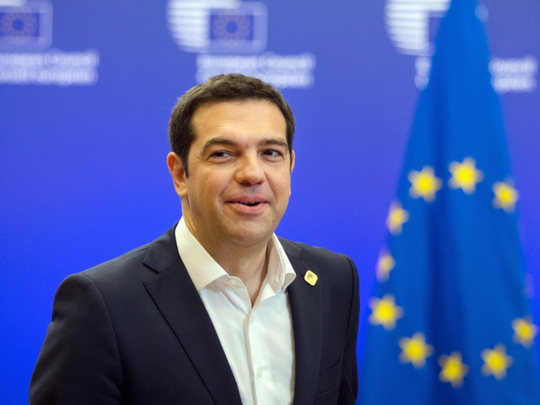
After months of fierce negotiations with its creditors, has Athens blinked? Fearful of the domestic reaction to a Greek default and the Grexit that would almost certainly have followed, its radical left, anti-austerity government gave ground and promised more tax increases and spending cuts. Not huge, but it seems almost enough.
Eurozone leaders who had gathered, amid deep pessimism and dire warnings, for an emergency summit last Monday night were able to go home on a positive note, raising hopes that a deal extending the Greek bailout will be announced by the end of this week. The International Monetary Fund (IMF), the European Central Bank (ECB) and the European Commission (EC) are said to be crunching the numbers in the Syriza proposals. But the need to keep the euro intact seems to have won out for now. That does not, of course, mean the matter is completely settled yet. There will be another meeting of Eurozone finance ministers this week, followed by a scheduled European Union (EU) heads of government summit.
British Prime Minister David Cameron may have wanted to use that meeting to discuss his demands for reform of the EU and the threat of Britain voting to leave it, but the likelihood is instead that this next summit will still be dominated by efforts to avert a Grexit. The sad thing is that whatever deal emerges now is unlikely to be much different from what could have been signed off a few months ago. In truth, the latest Greek offer, though now slightly improved, has never been too far off its creditors’ demands for deficit reductions.
In U-turn after U-turn, the Greeks had, over the course of the negotiations, included more and more austerity in each offer, despite pre-election pledges to reverse spending cuts. The latest plan apparently includes a tightening of the Greek value added tax regime.
It all suggests that in the end, if things go according to plan, politics will have prevailed: The risks associated with a possible exit of Greece from the euro, and even from the EU, outweighed those of keeping it in. That was clear from the reaction of the global financial markets, which all rallied after Monday’s announcement that the new Greek offer was a good basis for further discussion. Even US President Barack Obama had encouraged all parties to work towards a deal. The stakes were too high to do otherwise, and they still are.
For Greece, the small concessions the creditors now seem prepared to make on pensions and tax increases on the poor will at least allow Prime Minister Alexis Tsipras to save face with his electorate and overcome the difficulty of getting the proposals through his parliament. But he will also have seen off the threat of capital controls being imposed to stop any further outflow of money from Greece and a humiliating take-it-or-leave-it message from the creditors should the ECB have pulled the plug and stopped providing emergency liquidity assistance to the beleaguered Greek banking system.
More bailout money, but also more hardship and no — or very slow — growth. Yet, the reality is also that the extra austerity will now be tougher for Greece to bear and the cost of restoring the economy will be much greater. Just as the rest of the Eurozone is showing small signs of recovery the Greek economy has gone back into recession, with gross domestic product (GDP) falling by 0.4 per cent in the last three months of 2014 and by 0.2 per cent in the first three months of 2015. The signs are that the decline has continued, with unemployment rising again to 26 per cent. Many companies have gone out of business as activity stalled during the uncertainty surrounding the negotiations and banks’ non-performing loans now account for some 35 per cent of their total lending.
As a result, the effort required to restore health to the economy will be much greater. It is hard to imagine it now, but strong tourist receipts last year brought the first rise in Greek GDP after a five-year decline in which the economy had slid by 25 per cent under the IMF-inspired austerity programme. The recent reversal has wiped out much of that progress.
In itself that is not a recipe for social and political tranquillity. The creditor institutions, the old troika of the IMF, the ECB and the EC, will be as visible as ever. So actually, not much advance on the status quo of the last few years.
This gets us back to the perennial elephant in the room whenever Greece is discussed. The truth is, there will not be sustainable growth again until the huge debt overhang (180 per cent of GDP) is dealt with decisively. Greece will need to grow by at least 4 per cent a year to service its current debt. If forced down that road, nothing can be seen ahead for the Greek people but continuous belt-tightening and misery.
— Guardian News & Media Ltd
Vicky Pryce is the author of Prisonomics: Behind Bars in Britain’s Failing Prisons.








